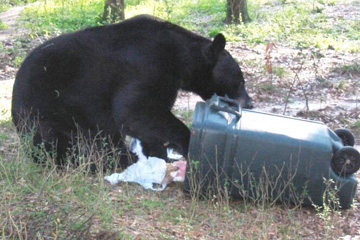Stash your garbage securely

Florida black bears turn into eating machines in late summer and early fall, stuffing their stomachs in preparation for winter. For gluttonous bears, raiding a garbage can may be more appealing than foraging in the woods. To reduce human-bear conflicts during the surge of bear activity in late summer and fall, the Florida Fish and Wildlife Conservation Commission (FWC) urges people to keep food sources around their homes and businesses secure from bears.
“Due to the current drought, Florida black bears are starting earlier and roaming farther this year in pursuit of the high-calorie meals that prepare them for winter,” said FWC Bear Management Program Coordinator David Telesco. “People should respect the fact that bears are large, powerful wild animals. If people secure their garbage and other sources of food, bears will be less tempted to hang around in places where they don’t belong.”
So what exactly is food for a bear? In the wild, black bears eat berries, nuts, fruits and insects, with small animals filling just 5 percent of their diet. In neighborhoods, bears are typically dining on household trash, birdseed or pet food.

“If a bear has to choose between spending a few minutes chomping on a bag of dog food or several hours trying to find and eat 5,000 acorns to get the same amount of calories, the bear is going for the dog food,” Telesco said. “Bear-proofing your property, however, can be as simple as storing garbage in a garage or shed and bringing in your pet food and birdseed at night.”
Preventing access to food is the most important thing people can do to keep bears wild and out of neighborhoods. Black bears are normally shy and afraid of people. But bears can lose their natural fear if they become accustomed to getting food from people, and a bear’s sense of smell is so keen that it can detect food more than a mile away. It is illegal in Florida to leave out food or garbage that will attract bears and cause human-bear conflicts.
With the number of Florida black bears up to about 3,000 and with cities and suburbs pushing farther into bear habitat, there are more chances people will encounter bears. Bears that leave forests to seek food are more likely to be killed: either hit by a vehicle, shot by a resident or euthanized by the FWC. If a bear is judged to present a risk to public safety, the FWC will euthanize the bear.
“Conflicts between people and bears are preventable,” Telesco said. “The majority of people who follow the FWC’s advice on how to safeguard food from bears don’t have conflicts.” He suggested that business owners and residents interested in getting bear-proof dumpsters and trash cans contact their waste service providers.
Go to MyFWC.com/Bear to learn more about living in bear country.
